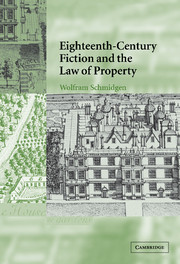Book contents
- Frontmatter
- Contents
- Acknowledgments
- Introduction
- 1 Communal form and the transitional culture of the eighteenth-century novel
- 2 Terra nullius, cannibalism, and the natural law of appropriation in Robinson Crusoe
- 3 Henry Fielding and the common law of plenitude
- 4 Commodity fetishism in heterogeneous spaces
- 5 Ann Radcliffe and the political economy of Gothic space
- 6 Scottish law and Waverley's museum of property
- Conclusion
- Notes
- Bibliography
- Index
3 - Henry Fielding and the common law of plenitude
Published online by Cambridge University Press: 22 September 2009
- Frontmatter
- Contents
- Acknowledgments
- Introduction
- 1 Communal form and the transitional culture of the eighteenth-century novel
- 2 Terra nullius, cannibalism, and the natural law of appropriation in Robinson Crusoe
- 3 Henry Fielding and the common law of plenitude
- 4 Commodity fetishism in heterogeneous spaces
- 5 Ann Radcliffe and the political economy of Gothic space
- 6 Scottish law and Waverley's museum of property
- Conclusion
- Notes
- Bibliography
- Index
Summary
In the third book of Joseph Andrews (1742), Henry Fielding engages in a characteristic act of generic differentiation. He criticizes “those romance-writers, who intitle their books, the History of England, the History of France, of Spain, &c.” because they only succeed in “describ[ing] countries and cities.” Though such histories attempt to give an account of the “actions and characters of men,” they are largely unsuccessful in this regard, producing “eternal contradictions.” Fielding proposes that these writers should be given a name that better accords with their area of greatest accomplishment: he suggests calling them “topographers or chorographers.” By distinction Fielding aligns his own writing practice with biography. His interest, he claims, lies in “actions and characters,” not “countries and cities.” Unlike the topographies of romance (which for Fielding included texts such as Robinson Crusoe), biography delivers a “narrative of facts” that “may be relied on, tho we often mistake the age and country wherein they happened.”
But while The History of the Adventures of Joseph Andrews focuses our attention on a person and not a place, it also indicates the instability of the generic distinctions Fielding invokes. It is, after all, a “history of adventures” and not a “biography” that Fielding's title announces. Nor does Fielding, as the term “adventures” already suggests, reject the genre of romance entirely. In the preface to his book, he recommends the category of “comic romance” to characterize his “kind of writing.” Far from being disturbed by such instabilities, Fielding's novelistic practice promotes them.
- Type
- Chapter
- Information
- Eighteenth-Century Fiction and the Law of Property , pp. 63 - 103Publisher: Cambridge University PressPrint publication year: 2002

